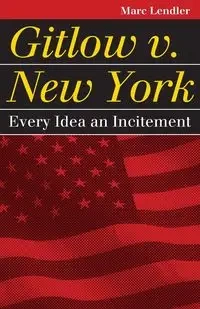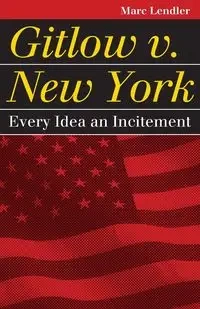Gitlow v. New York - Mark Lendler
Gitlow v. New York - Mark Lendler
- Every Idea an Incitement
AutorzyMark Lendler
EAN: 9780700618767
Symbol
050GKP03527KS
Rok wydania
2012
Elementy
190
Oprawa
Miekka
Format
14.0x21.6cm
Język
angielski

Bez ryzyka
14 dni na łatwy zwrot

Szeroki asortyment
ponad milion pozycji

Niskie ceny i rabaty
nawet do 50% każdego dnia
Niepotwierdzona zakupem
Ocena: /5
Symbol
050GKP03527KS
Kod producenta
9780700618767
Rok wydania
2012
Elementy
190
Oprawa
Miekka
Format
14.0x21.6cm
Język
angielski
Autorzy
Mark Lendler

In 1919 American Communist Party member Benjamin Gitlow was arrested for distributing a "Left Wing Manifesto," a publication inspired by the Russian Revolution. He was charged with violating New York's Criminal Anarchy Law of 1902, which outlawed the advocacy of any doctrine advocating to the violent overthrow of government. Gitlow argued that the law violated his right to free speech but was still convicted. He appealed and five years later the Supreme Court upheld his sentence by a vote of 7-2. Throughout the legal proceedings, much attention was devoted to the "bad tendency" doctrine--the idea that speakers and writers were responsible for the probable effects of their words--which the Supreme Court explicitly endorsed in its decision. According to Justice Edward T. Sanford, "A state may punish utterances endangering the foundations of organized government and threatening its overthrow by unlawful means." More important was Justice Oliver Wendell Holmes' dissent, in which he argued that the mere expression of ideas, separated from action, could not be punished under the "clear and present danger" doctrine. As Holmes put it, "Every idea is an incitement"--and the expression of an idea, no matter how disagreeable, was protected by the First Amendment. While the majority disagreed, it also raised and endorsed the idea that the Bill of Rights could be violated by neither the federal government nor individual states--an idea known as "incorporation" that was addressed for the first time in this case. In recreating Gitlow, Marc Lendler opens up the world of American radicalism and brings back into focus a number of key figures in American law: defense attorney Clarence Darrow; New York Court of Appeals justices Roscoe Pound and Benjamin Cardozo; Walter Pollak of the fledgling ACLU; and dissenting justices Oliver Wendell Holmes and Louis Brandeis. Lendler also traces the origins of the incorporation doctrine and the ebb and flow of Gitlow as a precedent through the end of the Cold War. In a time when Islamic radicalism raises many of the same questions as domestic Communism did, Lendler's cogent explication of this landmark case helps students and Court-watchers alike better understand "clear and present danger" tests, ongoing debates over incitement, and the importance of the Holmes-Brandeis dissent in our jurisprudence.
EAN: 9780700618767
EAN: 9780700618767
Niepotwierdzona zakupem
Ocena: /5
Zapytaj o produkt
Niepotwierdzona zakupem
Ocena: /5
Napisz swoją opinię

